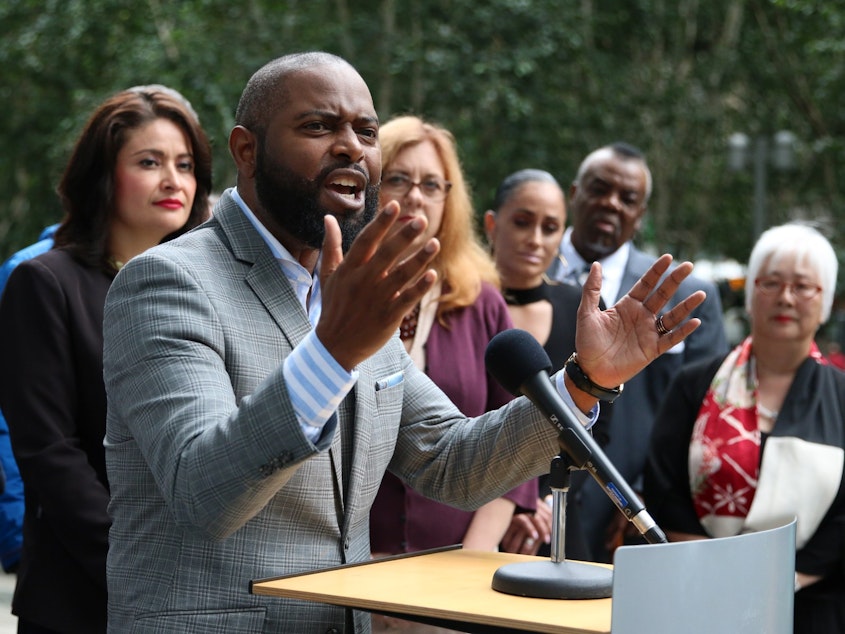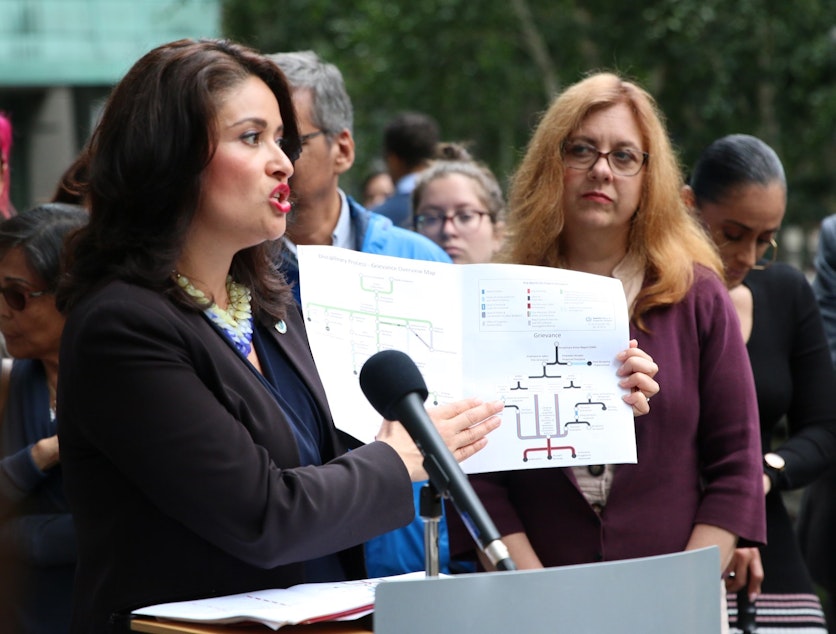Seattle police reform could backslide if steps not taken, critics say

Ever since First Nations woodcarver John Williams was fatally shot by Seattle Police in 2010, the police have been trying to prove to a federal judge that they have reformed.
But critics say Mayor Jenny Durkan and the Seattle Police Officers Guild have made that goal harder to achieve.
At a press conference on the steps of the Federal Courthouse Monday, Seattle City Councilmember Lorena González shared a letter outlining steps she says should help bring Seattle in conformance with a federal consent decree.
Those steps included renegotiating limited parts of the Seattle Police union contract and listening more closely to the advice of the local Community Police Commission.
Union Contract
Regarding the union contract, González was adamant that "asking for additional police reform is fundamentally not anti-cop or anti-labor."
She said that, as a labor-friendly council member, she was not seeking to blow up the contract. But rather, she, along with Councilmembers Lisa Herbold and Teresa Mosqueda, were asking the union to voluntarily come back to the table.
If the union refuses, they asked the mayor to set new expectations now for the next round of negotiation in 2020, so that the federal judge could see the promise of future progress.
Andre Taylor, founder of Not This Time, agreed with this approach and said the process of negotiating with the union should be one of give and take.
“In 2018, when they [The Seattle Police Officers Guild] were asking for a pay increase... we said absolutely, SPOG should have a pay increase," Taylor said. "But we were asking for accountability back then. We agreed with their pay increase, but now they’re disagreeing with accountability. And that’s problematic.”
A spokesperson for SPOG declined to comment.

Civilian Oversight
A few years ago, a group of civilians known as the Community Police Commission were given more oversight over how police investigate incidents and discipline officers.
But Councilmember González criticized the mayor for listening more to professional consultants than to this local civilian group.
“Centering our work on those voices – the voices of people who have lost brothers and sisters and other relatives to police violence– is what will ultimately lead to transformation of this system,” González said.
A spokesperson for the mayor said the national consultants will meet with the local civilian group this week, and that the mayor shares the goal of satisfying the federal judge.
"That process is underway, and the Court must approve this plan," wrote the spokesperson in an email.
"After this process is complete, the City can work with the DOJ, SPD, the Monitor, City Council, community, an accountability partners to move forward on next steps and will then seek the Court’s approval.
"The City looks forward to the opportunity to engage with the community to receive input on the development of our methodology for assessing the accountability regime. We also look forward to engaging with the broader community as we respond to the Court’s order and ultimately, have the Consent Decree fully lifted. "
Police frustration
Before González's news conference, Seattle Police Chief Carmen Best expressed frustration with the city's political leadership for low morale and officer retention problems after a violent weekend stretched police resources thin.
"We need them to stand up for the work that the officers, the men and women, have been doing in this organization," she said. "We are losing good people and we know it's because they feel like they're not supported by public officials."
Best cited exit interviews in which several officers said a lack of support from the City Council contributed to their decision to leave the department.
SPD says that it lost 90 officers last year and that the rate this year is outpacing the number of new recruits.




